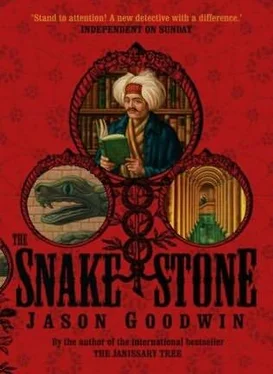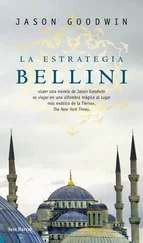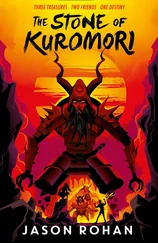Jason Goodwin - The snake stone
Здесь есть возможность читать онлайн «Jason Goodwin - The snake stone» весь текст электронной книги совершенно бесплатно (целиком полную версию без сокращений). В некоторых случаях можно слушать аудио, скачать через торрент в формате fb2 и присутствует краткое содержание. Жанр: Исторический детектив, на английском языке. Описание произведения, (предисловие) а так же отзывы посетителей доступны на портале библиотеки ЛибКат.
- Название:The snake stone
- Автор:
- Жанр:
- Год:неизвестен
- ISBN:нет данных
- Рейтинг книги:4 / 5. Голосов: 1
-
Избранное:Добавить в избранное
- Отзывы:
-
Ваша оценка:
- 80
- 1
- 2
- 3
- 4
- 5
The snake stone: краткое содержание, описание и аннотация
Предлагаем к чтению аннотацию, описание, краткое содержание или предисловие (зависит от того, что написал сам автор книги «The snake stone»). Если вы не нашли необходимую информацию о книге — напишите в комментариях, мы постараемся отыскать её.
The snake stone — читать онлайн бесплатно полную книгу (весь текст) целиком
Ниже представлен текст книги, разбитый по страницам. Система сохранения места последней прочитанной страницы, позволяет с удобством читать онлайн бесплатно книгу «The snake stone», без необходимости каждый раз заново искать на чём Вы остановились. Поставьте закладку, и сможете в любой момент перейти на страницу, на которой закончили чтение.
Интервал:
Закладка:
Yashim blinked. “The watermen?”
“They are, as I understand it, the oldest guild in the city. They would not go to Besiktas.”
Yashim pictured the arsenal, an ancient basilica that formed the lower corner of the first, most public court of the old palace. It had been used as a storehouse and a treasury; the last time he had seen inside, its walls were hung with flags and standards, and patterned with an arrangement of pikes and halberds from another age.
“But I don’t understand. Why would they meet there?”
The valide gave a pretty shrug. “Not why, Yashim, but when.” She raised a finger. “Tomorrow morning. They have a ceremony to introduce a new member to the guild.”
She watched Yashim’s astonishment with satisfaction. “I may attend,” she added. “As the oldest representative of our House, it is my right. But I am not so strong as before. I shall need assistance. Perhaps, Yashim-”
“I am at your service, Valide,” Yashim said humbly.
91
Yashim walked slowly out from the palace. Time was short, he’d told Palewski; but so far he hadn’t made much headway. He wondered what he should do next.
He thought of visiting the hammam, but instead of returning to Fener he found himself in the Hippodrome again, considering the broken column.
The serpents of the column emerged from a bronze ring, where you could read the names of thirty-one Greek cities-Athens, Sparta, Patras, Mycenae, and the rest of those jealous, warring city-states that combined in 479 B.C. against the Persian invader. At the battle of Plataia, the Persians were defeated by an army of Greeks, united for the very first time.
To commemorate that victory, the bronze weaponry and armor of the defeated Persians were melted down and recast to make the Serpent Column. It was set up at Delphi, a neutral place, the seat of the oracle respected by all Greeks alike. Entwined one upon the other, the three serpents soared into the air: unity was strength.
Yashim supposed that had the battle gone the other way, there would have been no Greece. No philosophy; no academy; no Alexander-and no Greeks.
Solemnly, he leaned against the rail. Twelve years ago, the Greeks had attempted to unite again. What was it that Dr. Millingen had said? That the Greeks were incapable of working together. Missilonghi was scarcely a battle. It was a siege, and the Greeks had lost it. No Serpent Column could be cast to commemorate those years.
But Lefevre had been there, hadn’t he? A doctor, like Millingen. Working together-for a cause.
Yashim pressed his forehead against the railings and closed his eyes. He tried to think: he had a sense that time was running out.
“Efendi.”
He turned, recognizing the voice.
“I saw you cross the Hippodrome, efendi.”
Yashim smiled at his friend. He had known, in the kebab house a few days earlier, that they would soon meet.
“I am glad to see you,” he said, and it was perfectly true. Seeing Murad Eslek standing in front of him, short, sturdy, and grinning from ear to ear, Yashim realized exactly why they were supposed to meet. Murad Eslek was a man who took each day as it came. He thought on his feet. He was efficient, reliable: a friend. He had once saved Yashim’s life.
But above all, Murad Eslek was an early riser. Every day, long before dawn, he would be at one of the market gardens beyond the city walls, overseeing the delivery of vegetables and fruit to half a dozen street markets around Istanbul. Carts and mules; donkeys with panniers; Murad Eslek and his men saw them into the city and arranged their distribution, so that when Istanbul woke up the stalls were piled high, as if by magic, with all the produce of the season.
“There’s something I wanted to ask you,” Yashim said. “Shall we have a coffee together?”
92
Dr. Millingen closed his bag and snapped the catch shut.
He glanced up the bed, to where the sultan lay drowsing against the pillows. Ten grains: enough, and not too much. Laudanum helped ease the pain.
The doctor frowned. When he told the eunuch that his business was with the living, not the dead, he was telling a half-truth. Sometimes people who were well came to him, he bled and dosed them, and they lived. Sometimes he protected people who would otherwise have died. But his business was with neither the living nor the dead: it was with the dying.
His job was to give them courage, or grant them oblivion; for it was seldom death itself that people feared. For most of them, it was the realization of its approach; as if death was easy, but dying came hard.
The sultan was sunk back against the pillows, and his skin was sunk back against the bones: he looked papery. His mouth was open, at a slight angle; his eyelids were almost purple. His breathing was so faint as to be almost imperceptible.
Millingen bent forward to put his hand close to the sultan’s mouth.
The sultan opened his eyes. They were lifeless and yellowed around the dark core of the iris.
“S’agit-il des mois, des jours, ou des heures?” His lips barely moved. Hours or days? Millingen had heard that weariness before. The sultan did not lack courage.
“On ne sait rien,” he said quietly. “On va de jour en jour.”
The sultan did not drop his gaze. Only his hand moved slowly over the counterpane, as if there were some effort he wished to make.
“Sultan?”
“The crown prince. Summon him now.”
“Yes, Sultan. I will send for him.”
Millingen turned and went to the door, instinctively aware that he was being watched. At the door he looked back. The sultan moved a finger: go.
He opened the door and stepped out into the corridor. Two footmen snapped to attention on either hand, and a small, thin man in a fez sprang up from the sofa.
“He asks to see the crown prince,” Millingen said. He knew it was probably futile; the prince had a morbid horror of the disease.
The little man bowed. Millingen wondered if he knew it was futile, too, as he scurried off down the corridor.
Millingen folded his arms and let his chin sink toward his chest.
A week, he thought. If only he could have another week.
A memory of something he had once read came into his mind: Suleyman the Magnificent, dead in his screened litter, rushed from the battlefield as if he were still alive. The grand vizier having discussions with his corpse, in order not to alarm the troops.
He pushed the thought aside.
This is not the age of Suleyman now, he told himself. This is the nineteenth century.
93
George was sitting out in the little courtyard behind the hospice, his big face tilted to the sun, his eyes closed, with a skein of wool looped around his hands.
He opened his eyes and saw two men standing in front of him.
“Ha!” George boomed, lifting the wool from his lap. “You finds me like old womans now!”
He slipped his huge hands out of the wool and set it gently on the bench beside him.
“I sleeps like an old Greek lady,” he grumbled. He squinted up at his visitors. “What for you bring this rogue here, Yashim efendi? You wants I have bad dreams?”
Yashim smiled. “Murad Eslek, this is George.”
Murad Eslek shook his head. “I know George, efendi. Old bloke. Sells veg at that excuse for a market up the way from here. This ain’t George. Why, this man’s half his age and twice his size.”
George closed his eyes again and laughed weakly.
“Murad has been telling me about the Constantinedes brothers,” Yashim said.
George’s laugh turned into a cough. His eyes bulged, and he thumped his chest.
“What for you cares about such shits?” He spat on the cobbles. “Even Murad Eslek knows. They is bad mens, efendi.”
Читать дальшеИнтервал:
Закладка:
Похожие книги на «The snake stone»
Представляем Вашему вниманию похожие книги на «The snake stone» списком для выбора. Мы отобрали схожую по названию и смыслу литературу в надежде предоставить читателям больше вариантов отыскать новые, интересные, ещё непрочитанные произведения.
Обсуждение, отзывы о книге «The snake stone» и просто собственные мнения читателей. Оставьте ваши комментарии, напишите, что Вы думаете о произведении, его смысле или главных героях. Укажите что конкретно понравилось, а что нет, и почему Вы так считаете.












